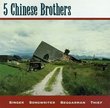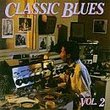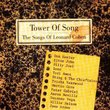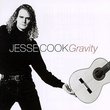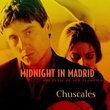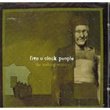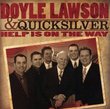| All Artists: Tracy Nelson Title: You'll Never Be a Stranger at My Door Members Wishing: 3 Total Copies: 0 Label: Memphis Int'l Original Release Date: 1/1/2007 Re-Release Date: 7/24/2007 Genres: Country, Blues, Pop Style: Contemporary Blues Number of Discs: 1 SwapaCD Credits: 1 UPC: 823862001929 |
Search - Tracy Nelson :: You'll Never Be a Stranger at My Door
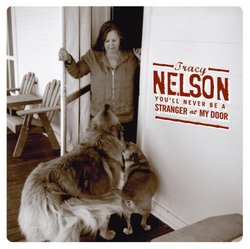 | Tracy Nelson You'll Never Be a Stranger at My Door Genres: Country, Blues, Pop
Nearly four decades after recording her influential classic Tracy Nelson Country, the former lead singer of Mother Earth--and a legend of white urban blues--returns to the country idiom with a collection of her favorite so... more » |
Larger Image |
CD DetailsSynopsis
Amazon.com Nearly four decades after recording her influential classic Tracy Nelson Country, the former lead singer of Mother Earth--and a legend of white urban blues--returns to the country idiom with a collection of her favorite songs. In a stunning turn, she kicks off the album with an inventive rendition of the western-jazz classic "Cow Cow Boogie," inspired not by the Tennessee Ernie Ford version, but Ella Fitzgerald's 1944 hit with the Ink Spots. (Here, Terry Tucker, Nelson's hair cutter, provides the charismatic black male vocal.) If nothing else that follows this charming performance is quite as grabby, Nelson instead offers up a ton of integrity in her emotionally resonant takes on Johnny Cash's "I Still Miss Someone," Jim Reeves's "Four Walls," the Everly Brothers' "I Wonder If I Care as Much," Don Gibson's "Oh, Lonesome Me" (framed as a Cajun caper), and Randy Sharp's elegant breakup song "New Way Out," with its exquisitely pained chorus. Nelson restrains her powerhouse alto--an instrument as authoritative as it is expansive--to take the focus off herself and emphasize melody and lyric. Her natural R&B leanings come to the fore on a reworking of Ernest Tubb's "Thanks a Lot" (shades of Brenda Lee), as well as on the warm and comforting "Stranger at My Door," a staple of her live repertoire for years. But the Wisconsin native best proves her understanding of the country genre on "Salt of the Earth," a song she co-wrote with Alice Newman Vestal and Guy Clark, who also contributes an affecting, if creaky, recitation. In recounting the plights of her Dickson, Tennessee, neighbors, all of whom lived by their "strong mind/simple creed," she forges a rock-solid connection to country's core--front-porch story songs about family and friends, life and death. Like all the music that pours out of her, Nelson's paean comes from the soul. --Alanna Nash Similarly Requested CDs
|
CD ReviewsAfter 38 Years, Tracy Sings Country - Again James Morris | Jackson Heights, NY United States | 07/27/2007 (5 out of 5 stars) "Tracy Nelson possesses a voice that is almost super-human, so powerful that no mere recording can ever quite capture it. She recently described herself as "a freak of nature" a self-deprecating portrait that is actually quite accurate, given the amazingly high volume she achieves with seeming ease. From the beginning of her career, she has recorded in a dizzying spiral of styles, often mixing Blues, R & B and Gospel-tinged Country-Rock in a single release, long before others began to blur the lines between musical genres. Today known as an icon of roots music, she seems content (as always) to perform for anyone who will listen, never compromising her vision or convictions. Her propensity to champion obscure songwriters has never endeared her to the top-forty crowd, but I for one am glad of it. Stranger at My Door is her first pure country effort since her legendary 1969 album, Tracy Nelson Country, but this is a different Tracy Nelson album for other reasons. While previous albums have underscored her powerful, soulful voice, she has chosen this time out to let singing take a back-seat to her other talent, that of choosing material that represents songwriting at its finest. Although anyone who has caught one of Tracy's recent recitals can attest that her voice has lost none of its power and depth (including me, having seen Tracy only months ago at B. B. Kings in NYC), here she has chosen a quieter path, allowing the material to be the real star. I have long opined that Tracy's real talent lies in her supremely exquisite taste, given that her awesome voice is, as she herself has suggested, merely a fact of her physicality. This ability, particularly in the fluff of today's music world, is not to be taken lightly. I have always trusted Tracy to deliver the goods both vocally and in her choice of material, even as I have never been sure which of these talents I admire more. I had always hoped, with my tongue planted firmly in my cheek, that Tracy might someday record a tribute to Ella Fitzgerald. Considering that Stranger at My Door is being touted as a return to her country roots, it is interesting that the album kick-starts with Cow Cow Boogie, a cowboy-jazz novelty number from Ella's Decca days, featuring an exact recreation of Ella's 1943 swing arrangement with the Ink Spots. Tracy's voice emphasizes a greater western inflection than Ella's jazz reading; as always, Tracy's fresh approach neither invites comparison to the original nor makes you long to hear it. After this light-hearted romp, she gets down to business with a set of traditional country ballads sure to please even the most demanding of purists. One hallmark of every new Tracy Nelson release is that my favorite track is apt to shift with each listen. Jim Reeves' Four Walls grabbed me immediately, her unusually restrained vocal showing off her ability to convey emotion impeccably, and after this second track, I pronounced the album a winner. But she floored me completely with the next song, Salt of the Earth, a composition of her own poetry, assisted by the able efforts of Guy Clark and Alice Newman. As soon as I heard it, Salt of the Earth became a favorite. A paean to country living and the "strong-minded, simple creed" of clean living, the imagery is nuanced and hauntingly beautiful. A songwriter of modesty, many fans often overlook Tracy's sizable writing abilities, which is partly her own fault; often in concert she will announce the songwriter for each song, then fall silent when she gets to her own material. After Salt of the Earth, she presents a perfectly-paced rendition of Johnny Cash's I Still Miss Someone, a staple that has been covered by more folk singers than country crooners. Continuing the album's thesis of heartfelt inflection and simple interpretation, she then tackles several more fairly well-known but lesser covered country gems. With Randy Sharp's New Way Out, the Everly Brothers' I Wonder If I Care As Much, and Brenda Lee's R & B tinged Thanks a Lot, she showcases her uncanny ability to pick outstanding material, while forgoing her usual vocal bravado. The remaining tracks are each interesting enough to merit detailed discussion. To be frank, I have never liked The Three Bells, a song made famous in the 1950's by The Browns, or the schmaltzy, overly sentimental treatments that Chanteuse Edith Piaf recorded in both French and English. Many years ago, the man who introduced me to Tracy's music used to make fun of its maudlin sentiment, once telling me that, "Tracy would never be caught dead recording a corny song like that; she has too much taste and class". Well, aside from the obvious comment of, "Never say never", he didn't consider one truism that I have long since learned to count on - Tracy Nelson is not just any singer. Very few vocalists could take a mushy song like The Three Bells and turn it into a work of art, but that's precisely what she's done. In her hands, its unbridled sentimentality is transformed into a piece so beautiful, that I am almost ashamed of my previous contempt for it. Few vocalists could take a song I had heretofore despised and make me hear new things in it, but Tracy has. Before closing on an upbeat tempo with her first foray into Western Swing (Oh, Lonesome Me), we get yet two more pieces of country balladry, so stunning in their beauty and Tracy's gorgeous interpretation that (at least for this week) I think I may have found my two favorite tracks. First is the waltz, I Never Loved Anyone More, originally recorded by Eddy Arnold and later covered by Lynn Anderson. The first listen made me freeze my CD player on "Repeat" until I had memorized every word of its achingly beautiful lyrics. Deceptively simple in melody and phrasing, it conjured up memories of lost love I'd forgotten for decades, inspiring feelings both bittersweet and genuine. But although I Never Loved Anyone More is sufficient for me to declare this release a satisfying success, and possibly her strongest album since her 1996 gem, Move On, there is still one more winner - the title track. Stranger at My Door proves that, at age 62, Tracy still has what her fans have been raving about for years. I hear things in this vocal that echo Tracy's best recordings of her celebrated golden era, even if many fans cannot agree exactly what period of her career that was. For every fan I've encountered who insists that Tracy's best records were made with Mother Earth in the late 1960's, I find as many who agree with me that her voice and musicianship peaked in the 1990's and continues to this day. Stranger At My Door is a gentle reproach to a long lost companion, a sort of lullaby to rekindled friendship, her voice as warm as syrup on a stack of steaming pancakes, and every bit as delicious. Before the month is out, I expect to change my mind a dozen times about which of the eleven songs here is the outstanding champion, but anyone who loves country music, or anyone who appreciates dazzling vocals, is sure to be pleasantly surprised by this album. It's taken Tracy 38 years to come full circle and produce a follow-up to "Tracy Nelson Country"; I only hope she doesn't wait that long to record classic country again." Tracy Nelson's New Country Gregor von Kallahann | 09/04/2007 (5 out of 5 stars) "In selecting material for this album, Tracy Nelson consulted with noted Nashville music journalist Robert K. Oermann, who (not surprisingly) has an extensive library of C&W classics. The goal was a simple one: to find great songs suitable for Tracy's strong, expressive voice. They came up with ten, added a Nelson original to the mix, and emerged with an album that is as much of classic as Tracy's first C&W release of some 38 years ago, the truly remarkable TRACY NELSON COUNTRY.
But speaking of the earlier album, probably the only minor argument I might have with Mr. Oermann would be his assertion that "nothing she has previously recorded prepared [him] for the performances on this collection." Well, I guess I can't speak for him, but the proudly eclectic Tracy Nelson has NEVER just been a "soul belter," as he seems to suggest, and yes, even though audiences have been rightly thrilled (or "demolished" as Oermann puts it) by some of her tour de force performances, these have nearly always been coupled with soulful ballads with plenty of subtlety and nuance. I guess I'm quibbling here, but the evidence for Tracy's subtlety has been on just about every single album. And certainly, it was there on TRACY NELSON COUNTRY--in spades in fact. I often tell the anecdote about how, upon hearing the earlier album for the first time at age 17, I kept waiting for the powerhouse endings. And there WERE a few such moments, notably the soaring finish to Tracy's version of "Stand By Your Man." But I expected a rowsing closer, certainly no less from the album's final track, "I'm So Lonesome I Could Cry," and I said to myself, "Tracy's really going to wail here: she'll show that B.J. Thomas how it's done." Well much to my teenage ears' surprise, she ended the song with on a simple, plaintive note. It took me years to realize how right she was to do so. She was (to use Bob Oermann's term) a "singer of restraint" even then! But I do understand the need to emphasize Tracy's subtlety on this (and other) albums. In Oermann's own book, FINDING HER VOICE, he referred to her "flamethrower voice" and that is something many of her fans have come to expect, even demand. In all honesty, I'll admit that in a concert situation, I would kinda disappointed if Tracy held back all evening long. But on this album, restraint is what's called for, and Tracy delivers. If anything, this effort is more good-humored than COUNTRY was. It opens with a bit of Country Swing in the form "Cow Cow Boogie," which opens the set on just the right note of fun. This spirited tune has been recorded by everyone from Tennessee Ernie Ford to the Judds, but it may be best remembered as having been a hit for Ella Fitzgerald. The number effectively announces Tracy's eclecticism, even when she has her feet planted firmly in Country ground. What follows the lively opening number is a selection of classy ballads and an array of uptempo numbers that pretty much match the spirit of the opener. If there is a prevailing spirit to the album, it might be one of dignified melancholy. For those who are suspicious of C&W music for its supposed mawkishness, it might come as a surprise to learn just how many country classics reflect a sober, matter-of-fact sensibility when it comes to matters of love and loss. I don't recall ever hearing as touching a break-up song in ANY genre as Randy Sharp's "New Way Out." Yeah, breaking up is hard to do, and it's agonizing even for the one calling it off, if this song is to be believed (as it should be). "Is there any new way out/where hearts are never broken...where harsh words are never spoken," she sings. What's notable here is not just the sorrow, but the compassion and clear-eyed maturity that are expressed. That same kind of maturity informs several other songs as well, including the beautiful title track "Stranger At My Door," penned by Charlie Black, R.M. Bourke and Kerry Chater and the Linda Hargrove/Mike Nesmith classic "I Never Loved Anyone More." Tracy entitled one her more classic R&B albums MOVE ON, and many of the numbers here are written from the point of view from disappointed lovers who HAVE moved on, but still have a few wistful remembrances. And the album embraces even larger themes as well: life,death and the whole durn thing. Tracy's own composition "Salt of the Earth," another number quite unlike anything else she's done before, is a story song, with extended spoken passages (featuring guest artist and songwriting collaborator Guy Clark). Based on the life stories of several of Tracy's rural Tennessee neighbors, it harkens back to an earlier era of songs and tales about hard-working men and women who "cleared the earth" and embraced a "simple creed." Tracy Nelson's best compositions heretofore have mainly been personal reflections (and I don't just mean "Down So Low," although that classic number is certainly a prime example) but this third person narrative proves her to be a master story teller as well. As a kind of companion piece to this mini-masterpiece, Nelson and her team have also included what many people might consider an old novelty number. Country and pop fans may recall the Browns' hit single from the late '50s "Three Bells," which seemed like classic downhome hokum to many a listener (and a guilty pleasure for most), but whose sentiment (as attested to by the Piaf version) was originally Gallic. Well, a bit of awe at the miracles of birth and love and at the spectre of death is a hallmark of all cultures. And if Tracy's own compostion expresses it more eloquently, this old chestnut reiterates the sentiment clearly (and even repeats the name "Brown" in the context of the lyrics). Sure it's a little corny, but it brings up those solemn themes of the earlier track on a less solemn, more predictable, and hence very reassuring note. Which allows us to close on a more rowsing and rowdy note a few tracks hence. Tracy closes the album with the Cajun sounding "Oh Lonesome Me," as spirited a romp in its way as the album's jazz tinged opener. Yeah, it's COUNTRY, but it's eclectic country. It's Tracy Nelson's kind of country. And I can't think of anyplace better. " |

 Track Listings (11) - Disc #1
Track Listings (11) - Disc #1